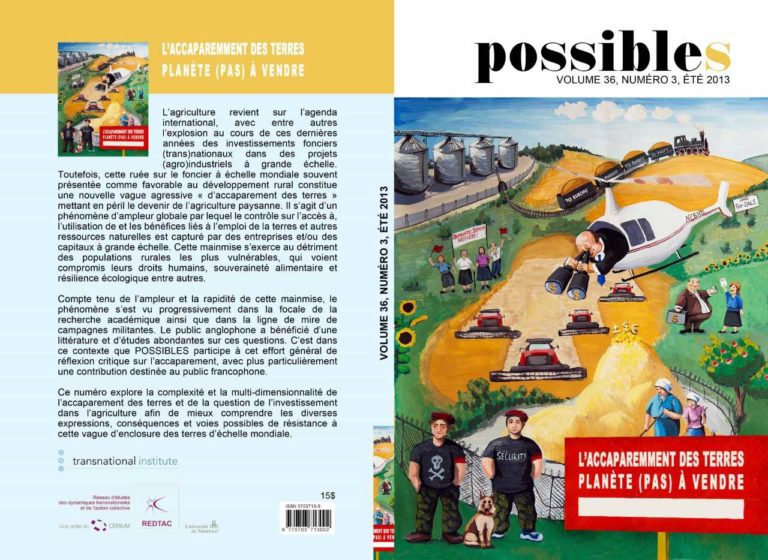Résumé
Le phénomène de l’accaparement des terres nécessite un changement de paradigme, non pas opposant l’investissement dans l’agriculture, mais le refaçonnant, afin qu’il serve un développement rural durable et réellement en faveur des plus pauvres. Dans la lignée de cette approche alternative, il faut ainsi se réapproprier la notion d’investissement. La reconnaissance des petits agriculteurs comme les principaux investisseurs dans l’agriculture est la première étape vers la récupération du lieu de souveraineté. L’article explore deux exemples de formes alternatives positives d’investissement, les régimes d’investissement de Cuba et du Zimbabwe.Références
Altieri, M. A. and F. R. Funes-Monzote (2012). «The Cuban Agriculture’s Paradox: The Persistence of the Agroecological Paradigm the Emergence of Biotechnology.» Monthly Review January 16-26.
Borras, S. M., J. C. Franco, et al. (2011). Land Grabbing in Latin America and the Caribbean Viewed from Broader International Perspectives. A paper prepared for and presented at the Latin America and Caribbean seminar: ‘Dinámicas en el mercado de la tierra en América Latina y el Caribe’, 14-15 November. Santiago, Chile.
CFS (2011). How to Increase Food Security and Smallholder-Sensitive Investment in Agriculture. 37th Session of the Committee on World Food Security Rome, FAO.
Cliffe, L., J. Alexander, et al. (2011). «An Overview of Fast Track Land Reform in Zimbabwe: Editorial Introduction.» Journal of Peasant Studies 38(5): 907-938.
De Schutter, O. (2010). Agro-ecology and the Right to Food: Report Presented at the 16th Session of the United Nations Human Rights Council New York, United Nations.
Helliker, K. (2011). «Book Review: Zimbabwe’s Land Reform: Myths and Realities by Scoones, I. et. al.» Journal of Contemporary African Studies 29(3): 349-351.
Holt-Gimenez, E. and A. Shattuck (2011). «Food Crises, Food Regimes and Food Movements: Rumbling of Reform or Tides of Transformation?» Journal of Peasant Studies 38(1): 109-144.
Mamdani, M. (2008). «Lessons of Zimbabwe.» London Review of Books 30(23): 17-21.
Moyo, S., W. Chambati, et al. (2009). Fast Track Land Reform Baseline Survey in Zimbabwe: Trends and Tendencies, 2005/06. Harare, African Institute for Agrarian Studies (AIAS).
Rosset, P. M. (1998). «Alternative Agriculture Works: The Case of Cuba.» Monthly Review 50(3).
Rosset, P. M., B. Machin Sosa, et al. (2011). «The Campesino-to-Campesino Agroecology Movement of ANAP in Cuba: Social Process Methodology in the Construction of Sustainable Peasant Agriculture and Food Sovereignty.» The Journal of Peasant Studies 38(1): 161-191.
Scoones, I., N. Marongwe, et al. (2011). Zimbabwe’s Land Reform: A Summary of Findings. Brighton, IDS.
Tharamangalam, J. (2008). Can Cuba Offer an Alternative to Corporate Control Over the World’s Food System? 20th Conference of North American and Cuban Philosophers and Social Scientists. Havana.
Van der Ploeg, J. D. (2008). The New Peasantries: Struggles for Autonomy and Sustainability in an Era of Empire and Globalization. London and Sterling, Earthscan.

